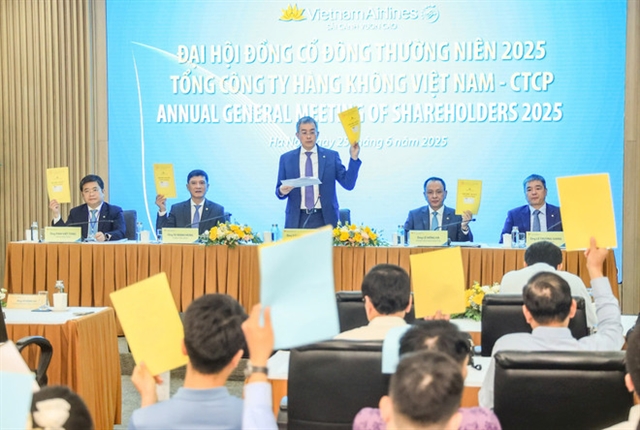This strategic move comes in response to the robust recovery of the international air cargo market, which has significantly contributed to the airline's positive financial performance.

HÀ NỘI — Vietnam Airlines recently announced its intention to establish a dedicated cargo airline, leveraging its expertise and resources in the aviation sector.
CEO Lê Hồng Hà unveiled the plan during the company’s annual shareholder meeting on June 25. This strategic move comes in response to the robust recovery of the international air cargo market, which has significantly contributed to the airline's positive financial performance.
In the second quarter of 2025, Vietnam Airlines reported that international cargo revenue accounted for a staggering 65 per cent of its total revenue.
The airline's revenue for this quarter exceeded VNĐ22.1 trillion (US$846 million), with a profit before tax estimated at around VNĐ1 trillion. As a result, the airline expects to achieve profits exceeding VNĐ4 trillion in the first half of the year, reflecting a 1.9 per cent increase in output compared to its targets.
Despite this promising outlook, Hà acknowledged the inherent risks in the air cargo market.
Factors such as rising fuel prices exceeding $95 per barrel, due to geopolitical tensions, particularly in the Middle East, pose significant challenges. These increased costs have pressured operational expenditures, compelling the airline to adjust its flight routes to avoid unsafe areas, which in turn extends flight durations and increases expenses.
To mitigate these risks, Vietnam Airlines is enhancing its operational stability by leasing additional aircraft and engines. The airline is also focused on diversifying its customer base to reduce reliance on specific market segments. This includes expanding its ticket sales network with international partners and accelerating digital transformation initiatives.
The national flag carrier also plans to convert several A321 aircraft for regional cargo routes starting in the fourth quarter of 2025, laying the groundwork for the new cargo airline set to launch in 2026.
The airline's commitment to building logistics hubs at domestic airports, such as Long Thành and Gia Bình, will further support its cargo operations.
Previously, Vietnam Airlines had aimed to sell nine A321ceo aircraft, successfully transferring three in the first quarter of 2024. However, due to soaring leasing prices and limited supply, the sale of the remaining six aircraft has been temporarily postponed.
This year, the airline is determined to enhance fleet utilisation efficiency, aiming for at least a 5 per cent improvement over 2024 figures. The company is also prioritising the recovery of international route markets, especially as A321neo aircraft return to service following engine repairs.
Additionally, the company continues to advance its digital transformation, partnering with tech firms VNPT and FPT to provide in-flight Wi-Fi and modernise IT systems. Its electronic identification system is already up and running as part of Việt Nam’s national digital transformation drive under Resolution 57-NQ/TW.
Sustainability is also a core priority. Vietnam Airlines is pursuing an Environmental, Social and Governance (ESG) roadmap to reduce emissions, improve fuel efficiency and adopt sustainable aviation fuels. It is also investing in workforce development, corporate culture and international management practices. — BIZHUB/VNS





